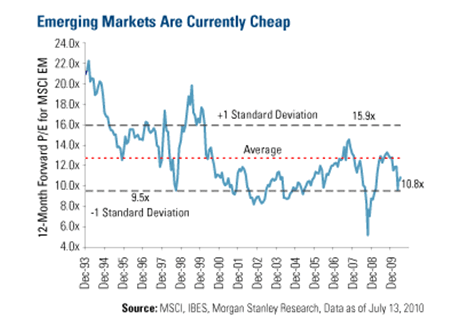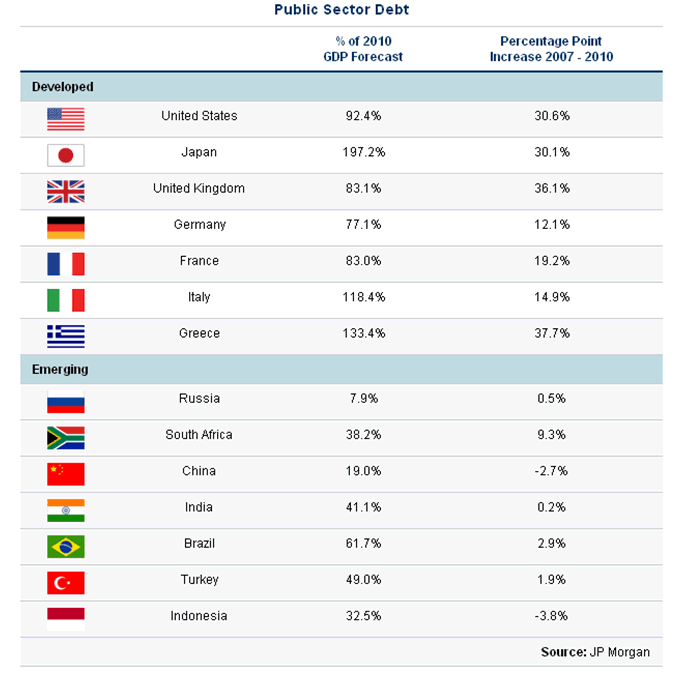The Case for Emerging Markets Investment Out Performance
Stock-Markets / Emerging Markets Jul 19, 2010 - 08:24 AM GMTBy: Frank_Holmes
 One of the best selling points for investing in emerging markets is growth potential, but like any other sector, this growth must come at a reasonable price.
One of the best selling points for investing in emerging markets is growth potential, but like any other sector, this growth must come at a reasonable price.
Emerging market stocks are cheap these days. The MSCI Emerging Markets Index has a 12-month forward price-to-earnings ratio of 10.8x, which is 15 percent below the P/E for the MSCI World Index. As you can see on the chart below, this valuation has rarely been more attractive – it is 15 percent below the long-term average.

On top of that, significant sales growth is expected in global emerging markets – 15 percent and 10 percent, respectively, for 2010 and 2011. The EMEA (Europe, Middle East and Africa) region is expected to lead the way – within EMEA, Turkey is seen as the star with nearly 30 percent sales growth this year and 17 percent in 2011.
Other emerging market standouts in expected sales growth: Taiwan (28 percent), Russia (15.8 percent) and India (15 percent). At 5.5 percent growth, the Philippines is expected to be the laggard.
Sales growth and margin expansion drive earnings growth – UBS predicts a 34 percent jump in earnings for emerging-market equities this year and another 12 percent in 2011.
Emerging market companies also have cleaner balance sheets and lower leverage compared to global peers. Debt-to-equity levels are low and heading lower – UBS sees a drop to 22 percent in 2011 from 28 percent this year. This balance sheet strength gives those companies strategic advantage in raising dividends and targeting their capital expenditure toward areas with the highest potential for return.

The table above from J.P. Morgan shows public-sector debt of selected countries in developed and emerging markets. The contrast is staggering, particularly the rate at which debt is growing in the largest economies – more than 30 percent this year in the U.S., Japan and Britain.
Among emerging markets, only Hungary and the Dominican Republic are expected to see double-digit increases in public-sector debt. China and Indonesia should see a decrease in 2010, while India and Russia are seen as pretty much flat.
This trend represents a major reversal from the past, when investors in developing economies often had to factor in large sovereign debt, high default risk and wildly fluctuating currencies. Government policy changes have contributed greatly to stronger economic fundamentals in many emerging nations, while policy moves by governments have been a source of weakness and uncertainty in the developed world.
Emerging markets have outperformed the world market by 400 basis points since April, when Europe’s sovereign debt crisis accelerated. The key factors discussed above – greater sales growth, cleaner balance sheets and cheaper valuations – make a good case for emerging-market equities to continue this outperformance over the longer term.
By Frank Holmes, CEO , U.S. Global Investors
Frank Holmes is CEO and chief investment officer at U.S. Global Investors , a Texas-based investment adviser that specializes in natural resources, emerging markets and global infrastructure. The company's 13 mutual funds include the Global Resources Fund (PSPFX) , Gold and Precious Metals Fund (USERX) and Global MegaTrends Fund (MEGAX) .
More timely commentary from Frank Holmes is available in his investment blog, “Frank Talk”: www.usfunds.com/franktalk .
Please consider carefully the fund's investment objectives, risks, charges and expenses. For this and other important information, obtain a fund prospectus by visiting www.usfunds.com or by calling 1-800-US-FUNDS (1-800-873-8637). Read it carefully before investing. Distributed by U.S. Global Brokerage, Inc.
All opinions expressed and data provided are subject to change without notice. Some of these opinions may not be appropriate to every investor. Gold funds may be susceptible to adverse economic, political or regulatory developments due to concentrating in a single theme. The price of gold is subject to substantial price fluctuations over short periods of time and may be affected by unpredicted international monetary and political policies. We suggest investing no more than 5% to 10% of your portfolio in gold or gold stocks. The following securities mentioned in the article were held by one or more of U.S. Global Investors family of funds as of 12-31-07 : streetTRACKS Gold Trust.
Frank Holmes Archive |
© 2005-2022 http://www.MarketOracle.co.uk - The Market Oracle is a FREE Daily Financial Markets Analysis & Forecasting online publication.



